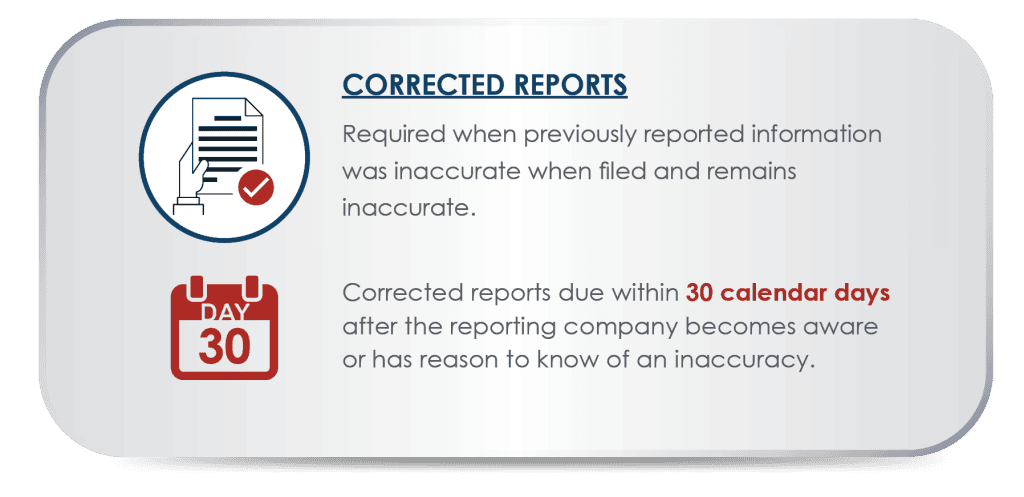File your Beneficial Ownership
Information Report Below for only $99
File your Beneficial Ownership
Information Report Below for only $99
Stress Free Compliance!
File Your Beneficial Owner Information Report (BOIR)
with Alto CPA Group, LLC
Non-compliance penalties can be severe. Avoid a penalty of $591 a day.
Update as of December 27, 2024:
The 5th Circuit U.S. Court of Appeals has suspended the BOI reporting requirement for owners of LLCs and corporations, citing serious constitutional concerns. This requirement, part of the Corporate Transparency Act, mandates that businesses disclose ownership information to the federal government, primarily impacting small businesses, as large corporations are exempt. Following emergency motions on December 23 and 27, 2024, the court declared the requirement to be unconstitutional and unenforceable by FinCEN, while the case, Texas Top Cop Shop, Inc. v. Garland, continues to undergo review with the potential for appeal to the U.S. Supreme Court. Although FinCEN is accepting voluntary filings, business owners are advised to consult legal counsel regarding compliance due to the ongoing legal uncertainties.
Should I still file my BOI by December 31, 2024, out of an abundance of caution?
Consulting with your attorney is recommended. However, many business owners are frustrated by the back and forth in the courts and are deciding to just file rather than await the outcome and final decision of the case. FinCEN is still accepting BOIs on a voluntary basis and we can help you.
Effective January 1, 2024, many U.S. businesses must report information about their beneficial owners—the individuals who directly or indirectly owns or controls 25% or more of the ownership interest of a reporting company to the Financial Crimes Enforcement Network (FinCEN), a bureau of the U.S. Department of the Treasury. Compliance is mandatory. The BOI report is an effort by FinCEN and the U.S. government to crack down on financial crimes. It will help law enforcement stop fraud, corruption, money laundering, terrorist financing, and similar activities.
The deadline:
- Companies created before January 1, 2024, have until January 1, 2025
- Companies created or registered after January 1, 2024, and before January 1, 2025, have 90 calendar days from their date of creation or registration.
- Companies created or registered on or after January 1, 2025 must file BOI within 30 calendar days after receiving actual or public notice that its creation or registration is effective.
- Any updates or corrections to beneficial ownership information that you previously filed with FinCEN must be submitted within 30 days.
Failure to properly file a BOI report may incur severe civil and criminal penalties, including fines of up to $100,000 and up to two years of prison time.
Who Has to Report?
Companies required to report are called "reporting companies". They are:
- a corporation, a limited liability company (LLC), or was otherwise created in the United States by filing a document with a secretary of state or any similar office under the law of a state or Indian tribe; or
- a foreign company and was registered to do business in any U.S. state or Indian tribe by such a filing
Why Choose Alto CPA Group, LLC for Your BOI Report?
At Alto CPA Group, LLC, we understand that your BOI report is an important federal requirement to stay compliant with and we will ensure you and your business avoids liability and having to pay hefty fines. Alto CPA Group, LLC will provide you with a detailed confirmation within 48 hours of your submission to us. You can rest assured that your information is safe, private, and never shared or sold.
The following Frequently Asked Questions (FAQs) is a condensed version of what FinCEN has prepared.
These FAQs are explanatory only and do not supplement or modify any obligations imposed by statute or regulation. Access and Safeguards Rule, available at www.fincen.gov/boi, for details on specific provisions. FinCEN expects to publish additional guidance in the future. Questions may be submitted on FinCEN’s Contact web page
General
What is beneficial ownership information?
Beneficial ownership information refers to identifying information about the individuals who directly or indirectly own or control a company.
Why do companies have to report beneficial ownership information to the U.S. Department of the Treasury?
In 2021, Congress passed the Corporate Transparency Act on a bipartisan basis. This law creates a new beneficial ownership information reporting requirement as part of the U.S. government’s efforts to make it harder for bad actors to hide or benefit from their ill-gotten gains through shell companies or other opaque ownership structures.
Under the Corporate Transparency Act, who can access beneficial ownership information?
FinCEN will permit Federal, State, local, and Tribal officials, as well as certain foreign officials who submit a request through a U.S. Federal government agency, to obtain beneficial ownership information for authorized activities related to national security, intelligence, and law enforcement. Financial institutions will have access to beneficial ownership information in certain circumstances, with the consent of the reporting company. Those financial institutions’ regulators will also have access to beneficial ownership information when they supervise the financial institutions.
FinCEN published the rule that will govern access to and protection of beneficial ownership information on December 22, 2023. Beneficial ownership information reported to FinCEN will be stored in a secure, non-public database using rigorous information security methods and controls typically used in the Federal government to protect non-classified yet sensitive information systems at the highest security level.
How will companies become aware of the BOI reporting requirements?
FinCEN is engaged in a robust outreach and education campaign to raise awareness of and help reporting companies understand the new reporting requirements.
Reporting Process
Should my company report beneficial ownership information now?
Yes.- A reporting company created or registered to do business before January 1, 2024, will have until January 1, 2025, to file its initial BOI report.
- A reporting company created or registered on or after January 1, 2024, and before January 1, 2025, will have 90 calendar days after receiving notice of the company’s creation or registration to file its initial BOI report. This 90-calendar day deadline runs from the time the company receives actual notice that its creation or registration is effective, or after a secretary of state or similar office first provides public notice of its creation or registration, whichever is earlier.
- A reporting company created or registered on or after January 1, 2025, will have 30 calendar days to file after receiving actual or public notice that its creation or registration is effective.
When will FinCEN accept beneficial ownership information reports?
Will there be a fee for submitting a beneficial ownership information report to FinCEN?
There is no fee for filing your own beneficial ownership information report to FinCEN.
Is a reporting company required to use an attorney or a certified public accountant (CPA) to submit beneficial ownership information to FinCEN?
No. Reporting companies that need help meeting their reporting obligations can consult with professional service providers such as lawyers or accountants.
Who can file a BOI report on behalf of a reporting company, and what information will be collected on filers?
Anyone whom the reporting company authorizes to act on its behalf—such as an employee, owner, or third-party service provider—may file a BOI report on the reporting company’s behalf.
Reporting Company and Exempt Companies
What companies will be required to report beneficial ownership information to FinCEN?
Companies required to report are called reporting companies. There are two types of reporting companies:
- Domestic reporting companies are corporations, limited liability companies, and any other entities created by the filing of a document with a secretary of state or any similar office in the United States.
- Foreign reporting companies are entities (including corporations and limited liability companies) formed under the law of a foreign country that have registered to do business in the United States by the filing of a document with a secretary of state or any similar office.
Yes, 23 types of entities are exempt from the beneficial ownership information reporting requirements. These entities include publicly traded companies meeting specified requirements, many nonprofits, and certain large operating companies.
- Securities reporting issuer
- Governmental authority
- Bank
- Credit union
- Depository institution holding company
- Money services business
- Broker or dealer in securities
- Securities exchange or clearing agency
- Other Exchange Act registered entity
- Investment company or investment adviser
- Venture capital fund adviser
- Insurance company
- State-licensed insurance producer
- Commodity Exchange Act registered entity
- Accounting firm
- Public utility
- Financial market utility
- Pooled investment vehicle
- Tax-exempt entity
- Entity assisting a tax-exempt entity
- Large operating company - More than 20 full time employees in the United States, greater than $5 million in revenue, gross receipts, or sales from within the United States reported on last year's tax return and has an operating presence at a physical office within the United States.
- Subsidiary of certain exempt entities
- Inactive entity
Are certain corporate entities, such as statutory trusts, business trusts, or foundations, reporting companies?
It depends. A domestic entity such as a statutory trust, business trust, or foundation is a reporting company only if it was created by the filing of a document with a secretary of state or similar office. Likewise, a foreign entity is a reporting company only if it filed a document with a secretary of state or a similar office to register to do business in the United States.
Entities should also consider if any exemptions to the reporting requirements apply to them. For example, a foundation may not be required to report beneficial ownership information to FinCEN if the foundation qualifies for the tax-exempt entity exemption.
Is a trust considered a reporting company if it registers with a court of law for the purpose of establishing the court’s jurisdiction over any disputes involving the trust?
No. The registration of a trust with a court of law merely to establish the court’s jurisdiction over any disputes involving the trust does not make the trust a reporting company.
Does the activity or revenue of a company determine whether it is a reporting company?
Sometimes. An entity’s activities and revenue, along with other factors in some cases, can qualify it for one of those exemptions. For example, there is an exemption for certain inactive entities, and another for any company that reported more than $5 million in gross receipts or sales in the previous year and satisfies other exemption criteria. Neither engaging solely in passive activities like holding rental properties, for example, nor being unprofitable necessarily exempts an entity from the BOI reporting requirements.
Is a sole proprietorship a reporting company?
No, unless a sole proprietorship was created (or, if a foreign sole proprietorship, registered to do business) in the United States by filing a document with a secretary of state or similar office.
Can a company created or registered in a U.S. territory be considered a reporting company?
Yes. In addition to companies in the 50 states and the District of Columbia, a company that is created or registered to do business by the filing of a document with a U.S. territory’s secretary of state or similar office, and that does not qualify for any exemptions to the reporting requirements, is required to report beneficial ownership information to FinCEN.
Do the BOI reporting requirements apply to S-Corporations?
Yes. If the company was created or registered to do business by the filing of a document with a secretary of state or similar office, and does not qualify for any of the exemptions to the reporting requirements—must comply with the reporting requirements.
If a domestic corporation or limited liability company is not created by the filing of a document with a secretary of state or similar office, is it a reporting company?
No.
Are homeowner’s associations reporting companies?
It depends. Homeowner’s associations (HOAs) can take different corporate forms. As with any entity, if an HOA was not created by the filing of a document with a secretary of state or similar office, then it is not a domestic reporting company.
Beneficial Owner
Who is a beneficial owner of a reporting company?
A beneficial owner is an individual who either directly or indirectly: (1) exercises substantial control over a reporting company, or (2) owns or controls at least 25 percent of a reporting company’s ownership interests. Because beneficial owners must be individuals (i.e., natural persons), trusts, corporations, or other legal entities are not considered to be beneficial owners. However, in specific circumstances, information about an entity may be reported in lieu of information about a beneficial owner.
What is substantial control?
An individual can exercise substantial control over a reporting company in four diverse ways. If the individual falls into any of the categories below, the individual is exercising substantial control:
- The individual is a senior officer (the company’s president, chief financial officer, general counsel, chief executive office, chief operating officer, or any other officer who performs a similar function).
- The individual has authority to appoint or remove certain officers or most directors (or similar body) of the reporting company.
- The individual is an important decision-maker for the reporting company.
- The individual has any other form of substantial control over the reporting company.
One of the indicators of substantial control is that the individual is an important decision-maker. What are important decisions?
Important decisions include decisions about a reporting company’s business, finances, and structure. An individual that directs, determines, or has substantial influence over these important decisions exercises substantial control over a reporting company.
What is an ownership interest?
An ownership interest is an arrangement that establishes ownership rights in the reporting company. Examples of ownership interests include shares of equity, stock, voting rights, or any other mechanism used to establish ownership.
Who qualifies for an exception from the beneficial owner definition?
There are five instances in which an individual who would otherwise be a beneficial owner of a reporting company qualifies for an exception. In those cases, the reporting company does not have to report that individual as a beneficial owner to FinCEN.
What information should a reporting company report about a beneficial owner who holds their ownership interests in the reporting company through multiple exempt entities?
If a beneficial owner owns or controls their ownership interests in a reporting company exclusively through multiple exempt entities, then the names of all those exempt entities may be reported to FinCEN instead of the individual beneficial owner’s information.
Note that this special rule does not apply when an individual owns or controls ownership interests in a reporting company through both exempt and non-exempt entities. In that case, the reporting company must report the individual as a beneficial owner (if no exception applies), but the exempt companies do not need to be listed.
Is an unaffiliated company that provides a service to the reporting company by managing its day-to-day operations, but does not make decisions on important matters, a beneficial owner of the reporting company?
The unaffiliated company itself cannot be a beneficial owner of the reporting company because a beneficial owner must be an individual. Any individuals that exercise substantial control over the reporting company through the unaffiliated company must be reported as beneficial owners of the reporting company. However, individuals who do not direct, determine, or have substantial influence over important decisions made by the reporting company, and do not otherwise exercise substantial control, may not be beneficial owners of the reporting company.
Is a member of a reporting company’s board of directors always a beneficial owner of the reporting company?
No. Whether a particular director meets any of these criteria is a question that the reporting company must consider on a director-by-director basis.
Is a reporting company’s designated “partnership representative” or “tax matters partner” a beneficial owner?
It depends. A reporting company’s “partnership representative,” as defined in 26 U.S.C. 6223, or “tax matters partner,” as the term was previously defined in now-repealed 26 U.S.C. 6231(a)(7), is not automatically a beneficial owner of the reporting company.
Note that a “partnership representative” or “tax matters partner” serving in the role of a designated agent of the reporting company may qualify for the “nominee, intermediary, custodian, or agent” exception from the beneficial owner definition.
What should a reporting company report if its ownership is in dispute?
If ownership of a reporting company is the subject of active litigation and an initial BOI report has not been filed, a person authorized by the company to file its beneficial ownership information should comply with the requirements by reporting:
- all individuals who exercise substantial control over the company, and
- all individuals who own or control, or have a claim to ownership or control of, at least 25 percent ownership interests in the company.
If an initial BOI report has been filed, and if the resolution of the litigation leads to the reporting company having different beneficial owners from those reported (for example, because some individuals’ claims to ownership or control have been rejected), the reporting company must file an updated BOI report within 30 calendar days of resolution of the litigation.
Who does a reporting company report as a beneficial owner if a corporate entity owns or controls 25 percent or more of the ownership interests of the reporting company?
Ordinarily, such a reporting company reports the individuals who indirectly either (1) exercise substantial control over the reporting company or (2) own or control at least 25 percent of the ownership interests in the reporting company through the corporate entity. It should not report the corporate entity that acts as an intermediate for the individuals.
Two special rules create exceptions to this general rule in specific circumstances:
- A reporting company may report the name(s) of an exempt entity or entities in lieu of an individual beneficial owner who owns or controls ownership interests in the reporting company entirely through ownership interests in the exempt entity or entities; or
- If the beneficial owners of the reporting company and the intermediate company are the same individuals, a reporting company may report the FinCEN identifier and full legal name of an intermediate company through which an individual is a beneficial owner of the reporting company.
Who is the beneficial owner of a homeowner’s association?
A homeowner’s association (HOA) that meets the reporting company definition and does not qualify for any exemptions must report its beneficial owner(s). There may be instances in which no individuals own or control at least 25 percent of the ownership interests of an HOA that is a reporting company. However, FinCEN expects that at least one individual exercise substantial control over each reporting company. Individuals who meet one of the following criteria are considered to exercise substantial control over the HOA:
- the individual is a senior officer;
- the individual has authority to appoint or remove certain officers or most directors of the HOA;
- the individual is an important decision-maker; or
- the individual has any other form of substantial control over the HOA.
Can beneficial owners own or control reporting companies through trusts?
Yes, beneficial owners can own or control a reporting company through trusts.
Company Applicant
Who is a company applicant of a reporting company?
Only reporting companies created or registered on or after January 1, 2024, will need to report their company applicants.
A company that must report its company applicants will have only up to two individuals who could qualify as company applicants:
- The individual who directly files the document that creates or registers the company; and
- If more than one person is involved in the filing, the individual who is primarily responsible for directing or controlling the filing.
Is my accountant or lawyer considered a company applicant?
An accountant or lawyer may be a company applicant if they directly filed the document that created or registered the reporting company. If more than one person is involved in the filing of the creation or registration document, an accountant or lawyer may be a company applicant if they are primarily responsible for directing or controlling the filing.
For example, an attorney at a law firm that offers business formation services may be primarily responsible for overseeing preparation and filing of a reporting company’s incorporation documents. A paralegal at the law firm may directly file the incorporation documents at the attorney’s request. Under those circumstances, the attorney and the paralegal are both company applicants for the reporting company.Can a company applicant be removed from a BOI report if the company applicant no longer has a relationship with the reporting company?
No. A company applicant may not be removed from a BOI report even if the company applicant no longer has a relationship with the reporting company. A reporting company created on or after January 1, 2024, is required to report company applicant information in its initial BOI report but is not required to file an updated BOI report if information about a company applicant changes.
The company applicants of a reporting company include the individual “primarily responsible for directing the filing of the creation or registration document.” What makes an individual “primarily responsible” for directing such a filing?
- At most, two individuals need to be reported as company applicants:
- if more than one person is involved in the filing of the document, the person who is primarily responsible for directing or controlling the filing.
For the purposes of determining who is a company applicant, it is not relevant who signs the creation or registration document, for example, as an incorporator. To determine who is primarily responsible for directing or controlling the filing of the document, consider who is responsible for making the decisions about the filing of the document, such as how the filing is managed, what content the document includes, and when and where the filing occurs. The following three scenarios provide examples.
Scenario 1: Consider an attorney who completes a company creation document using information provided by a client, and then sends the document to a corporate service provider for filing with a secretary of state. In this example:
- The attorney is the company applicant who is primarily responsible for directing or controlling the filing because they prepared the creation document and directed the corporate service provider to file it.
- The individual at the corporate service provider is the company applicant who directly filed the document with the secretary of state.
Scenario 2: If the attorney instructs a paralegal to complete the preparation of the creation document, rather than doing so themself, before directing the corporate service provider to file the document, the outcome remains the same: the attorney and the individual at the corporate service provider who files the document are company applicants. The paralegal is not a company applicant because the attorney played a greater role than the paralegal in making substantive decisions about the filing of the document.
Scenario 3: If the client who initiated the company creation directly asks the corporate service provider to file the document to create the company, then the client is primarily responsible for directing or controlling the filing, and the client should be reported as a company applicant, along with the individual at the corporate service provider who files the document.
Is a third-party courier or delivery service employee who only delivers documents that create or register a reporting company a company applicant?
No. A third-party courier or delivery service employee who only delivers documents to a secretary of state or similar office is not a company applicant provided they meet one condition: the third-party courier, the delivery service employee, and any delivery service that employs them does not play any other role in the creation or registration of the reporting company.
When a third-party courier or delivery service employee is used solely for delivery, the individual (e.g., at a business formation service or law firm) who requested the third-party courier or delivery service to deliver the document will typically be a company applicant.
Under FinCEN’s regulations, an individual who “directly files the document” that creates or registers the reporting company is a company applicant. Third-party couriers or delivery service employees who deliver such documents facilitate the documents’ filing, but FinCEN does not consider them to be the filers of the documents given their only connection to the creation or registration of the reporting company is couriering the documents.
Rather, when a third-party courier or delivery service is used by a firm, the company applicant who “directly files” the creation or registration document is the individual at the firm who requests that the third-party courier or delivery service deliver the documents.
- For example, an attorney at a law firm may be involved in the preparation of incorporation documents. The attorney directs a paralegal to file the documents. The paralegal may then request a third-party delivery service to deliver the incorporation documents to the secretary of state’s office. The paralegal is the company applicant who directly files the documents, even though the third-party delivery service delivered the documents on the paralegal’s behalf. The attorney at the law firm who was involved in the preparation of the incorporation documents and who directed the paralegal to file the documents will also be a company applicant because the attorney was primarily responsible for directing or controlling the filing of the documents.
In contrast, if a courier is employed by a business formation service, law firm, or other entity that plays a role in the creation or registration of the reporting company, such as drafting the relevant documents or compiling information to be submitted as part of the documents delivered, the conclusion is different. FinCEN considers such a courier to have directly filed the documents—and thus to be a company applicant—given the courier’s greater connection (via the courier’s employer) to the creation or registration of the company.
- For example, a mailroom employee at a law firm may physically deliver the document that creates a reporting company at the direction of an attorney at the law firm who is primarily responsible for decisions related to the filing. Both individuals are company applicants.
Will a reporting company need to report any other information in addition to information about its beneficial owners?
Yes. The information that needs to be reported, however, depends on when the company was created or registered.
- If a reporting company is created or registered on or after January 1, 2024, the reporting company will need to report information about itself, its beneficial owners, and its company applicants.
- If a reporting company was created or registered before January 1, 2024, the reporting company only needs to provide information about itself and its beneficial owners. The reporting company does not need to provide information about its company applicants.
What information will a reporting company have to report about itself?
A reporting company will have to report:
- Its legal name;
- Any trade names, “doing business as” (d/b/a), or “trading as” (t/a) names;
- The current street address of its principal place of business if that address is in the United States (for example, a U.S. reporting company’s headquarters), or, for reporting companies whose principal place of business is outside the United States, the current address from which the company conducts business in the United States (for example, a foreign reporting company’s U.S. headquarters);
- Its jurisdiction of formation or registration; and
- Its Taxpayer Identification Number (or, if a foreign reporting company has not been issued a TIN, a tax identification number issued by a foreign jurisdiction and the name of the jurisdiction).
A reporting company will also have to indicate whether it is filing an initial report, or a correction or an update of a prior report.
What information will a reporting company have to report about its beneficial owners?
For each individual who is a beneficial owner, a reporting company will have to provide:
1. The individual’s name;
2. Date of birth;
3. Residential address; and
4. An identifying number from an acceptable identification document such as a passport or U.S. driver’s license, and the name of the issuing state or jurisdiction of identification document.
What information will a reporting company have to report about its company applicants?
For each individual who is a company applicant, a reporting company will have to provide:
- The individual’s name;
- Date of birth;
- Address; and
- An identifying number from an acceptable identification document such as a passport or U.S. driver’s license, and the name of the issuing state or jurisdiction of identification document
- The reporting company will also have to report an image of the identification document used to obtain the identifying number in item 4
If the company applicant works in corporate formation—for example, as an attorney or corporate formation agent—then the reporting company must report the company applicant’s business address. Otherwise, the reporting company must report the company applicant’s residential address.
What are some acceptable forms of identification that will meet the reporting requirement?
The only acceptable forms of identification are:
- A non-expired U.S. driver’s license (including any driver’s licenses issued by a commonwealth, territory, or possession of the United States);
- A non-expired identification document issued by a U.S. state or local government, or Indian Tribe;
- A non-expired passport issued by the U.S. government; or
- A non-expired passport issued by a foreign government (only when an individual does not have one of the other three forms of identification listed above).
Is there a requirement to annually report beneficial ownership information?
No. There is no annual reporting requirement. Reporting companies must file an initial BOI report and updated or corrected BOI reports as needed.
Does a reporting company have to report information about its parent or subsidiary companies?
No, though if a special reporting rule applies, the reporting company may report a parent company’s name instead of beneficial ownership information. However, under a special reporting rule, a reporting company may report a parent company’s name in lieu of information about its beneficial owners if its beneficial owners only hold their ownership interest in the reporting company through the parent company and the parent company is an exempt entity.
Can a reporting company report a P.O. box as its current address?
No. The reporting company address must be a U.S. street address and cannot be a P.O. box.
Have I met FinCEN’s BOI reporting obligation if I filed a form or report that provides beneficial ownership information to a state office, a financial institution, or the IRS?
No. Reporting companies must report beneficial ownership information directly to FinCEN.
If a beneficial owner or company applicant’s acceptable identification document does not include a photograph for religious reasons, will FinCEN accept the identification document without the photograph?
Yes. If a beneficial owner or company applicant’s identification document does not include a photograph for religious reasons, the reporting company may nonetheless submit an image of that identification document when submitting its report, as long as the identification document is one of the types of identification accepted by FinCEN, such as a non-expired State-issued identification document.
What residential address should be reported if a reporting company is required to a report an individual’s residential address, but that individual does not have a permanent residential residence?
The residential address that is current at the time of filing should be reported to FinCEN.
What address should a reporting company report if it lacks a principal place of business in the United States?
If a reporting company does not have a principal place of business in the United States, then the company must report to FinCEN as its address the primary location in the United States where it conducts business.
If a reporting company has no principal place of business in the United States and conducts business at more than one location within the United States, then the reporting company may report as its primary location the address of any of those locations where the reporting company receives important correspondence.
If a reporting company has no principal place of business in the United States and does not conduct business functions at any location in the United States, then its primary location is the address in the United States of the person that the reporting company, under State or other applicable law, has designated to accept service of legal process on its behalf In some jurisdictions, this person is referred to as the reporting company’s registered agent, or the address is referred to as the registered office. Such a reporting company should report this address to FinCEN as its address.
Initial Report
When do I have to file an initial beneficial ownership information report with FinCEN?
If your company existed before January 1, 2024, it must file its initial beneficial ownership information report by January 1, 2025.
Can a parent company file a single BOI report on behalf of its group of companies?
No. Any company that meets the definition of a reporting company and is not exempt is required to file its own BOI report.
How can I obtain a Taxpayer Identification Number (TIN) for a new company quickly so that I can file an initial beneficial ownership information report on time?
The Internal Revenue Service (IRS) offers a free online application for an Employer Identification Number (EIN), a type of TIN, which is provided immediately upon submission of the application.
A paper filing is required if a foreign person that does not have an Individual Taxpayer Identification Number (ITIN) applies for an EIN. According to the IRS, receiving an EIN through this process could take six to eight weeks.
Should an initial BOI report include historical beneficial owners of a reporting company, or only beneficial owners as of the time of filing?
An initial BOI report should only include the beneficial owners as of the time of the filing.
How does a company created or registered after January 1, 2024, determine its date of creation or registration?
The date of creation or registration for a reporting company is the earlier of the date on which: (1) the reporting company receives actual notice that its creation (or registration) has become effective; or (2) a secretary of state or similar office first provides public notice, such as through a publicly accessible registry, that the domestic reporting company has been created or the foreign reporting company has been registered.
A company that was created or registered before January 1, 2024, and was exempt from the BOI reporting requirements loses its exempt status between January 1, 2024, and January 1, 2025. How long does the reporting company have to file its initial BOI report?
Normally, a company that loses its exempt status must file a BOI report with FinCEN within thirty calendar days after the date that it no longer meets the criteria for any exemption.
FinCEN has determined that previously exempt entities that existed before 2024 and lose their exempt status in 2024 will receive the benefit of whichever of these two timeframes is longer: (1) the remaining days left in the one-year filing period for existing companies; or (2) the 30-calendar-day period for companies that lose their exempt status.
Thus, for example, if an existing reporting company ceases to be exempt on February 1, 2024, the company will have until January 1, 2025, to file its initial BOI report. If the company ceases to be exempt on December 15, 2024, the company will have until January 14, 2025, to file its initial BOI report.
Updated Report
What should I do if previously reported information changes?
If there is any change to the required information about your company or its beneficial owners in a beneficial ownership information report that your company filed, your company must file an updated report no later than 30 days after the date of the change.
A reporting company is not required to file an updated report for any changes to previously reported information about a company applicant.
What are some triggers for needing to update a beneficial ownership information report?
The following are some examples of the changes that would require an updated beneficial ownership information report:
- Any change to the information reported for the reporting company, such as registering a new business name.
- A change in beneficial owners, such as a new CEO, or a sale that changes who meets the ownership interest threshold of 25 percent.
- Any change to a beneficial owner’s name, address, or unique identifying number previously provided to FinCEN. If a beneficial owner obtained a new driver’s license or other identifying document that includes a changed name, address, or identifying number, the reporting company also would have to file an updated beneficial ownership information report with FinCEN, including an image of the new identifying document.
Is an updated BOI report required when the type of ownership interest a beneficial owner has in a reporting company changes?
No. A change to the type of ownership interest a beneficial owner has in a reporting company—for example, a conversion of preferred shares to common stock—does not require the reporting company to file an updated BOI report because FinCEN does not require companies to report the type of interest. Updated BOI reports are required when information reported to FinCEN about the reporting company or its beneficial owners’ changes.
If a reporting company needs to update one piece of information on a BOI report, such as its legal name, does the reporting company have to fill out an entire new BOI report?
Updated BOI reports will require all fields to be submitted, including the updated pieces of information. For example, if a reporting company changes its legal name, the reporting company will need to file an updated BOI report to include the new legal name and the previously reported, unchanged information about the company, its beneficial owners, and, if required, its company applicants.
Can a filer submit a late updated BOI report?
An updated BOI report can be submitted to FinCEN at any time. However, the reporting company is responsible for ensuring that updates are filed within 30 days of a change occurring.
If a reporting company last filed a “newly exempt entity” BOI report but subsequently loses its exempt status, what should it do?
A reporting company should file an updated BOI report with FinCEN with the company’s current beneficial ownership information when it determines it no longer qualifies for an exemption.
Corrected Report
What should I do if I learn of an inaccuracy in a report?
If a beneficial ownership information report is inaccurate, your company must correct it no later than 30 days after the date your company became aware of the inaccuracy or had reason to know of it. This includes any inaccuracy in the required information provided about your company, its beneficial owners, or its company applicants.
What should a reporting company do if it becomes exempt after already filing a report?
If a reporting company filed a beneficial ownership information report but then becomes exempt from filing the report, the company should file an updated report indicating that it is no longer a reporting company. An updated BOI report for a newly exempt entity will only require that: (1) the entity identify itself; and (2) check a box noting its newly exempt status.
Compliance/Enforcement
What happens if a reporting company does not report beneficial ownership information to FinCEN or fails to update or correct the information within the required timeframe?
If you correct a mistake or omission within 90 days of the deadline for the original report, you may avoid being penalized. However, you could face civil and criminal penalties if you disregard your beneficial ownership information reporting obligations.
What penalties do individuals face for violating BOI reporting requirements?
A person who willfully violates the BOI reporting requirements may be subject to civil penalties of up to $500 for each day that the violation continues. However, this civil penalty amount is adjusted annually for inflation. As of the time of publication of this FAQ, this amount is $591.
A person who willfully violates the BOI reporting requirements may also be subject to criminal penalties of up to two years imprisonment and a fine of up to $10,000. Potential violations include willfully failing to file a beneficial ownership information report, willfully filing false beneficial ownership information, or willfully failing to correct or update previously reported beneficial ownership information.
Who can be held liable for violating BOI reporting requirements?
Both individuals and corporate entities can be held liable for willful violations. This can include not only an individual who files (or attempts to file) false information with FinCEN, but also anyone who willfully provides the filer with false information to report. Both individuals and corporate entities may also be liable for willfully failing to report complete or updated beneficial ownership information; in such circumstances, individuals can be held liable if they either cause the failure or are a senior officer at the company at the time of the failure.
Can an individual who files a report on behalf of a reporting company be held liable?
Yes. An individual who willfully files a false or fraudulent beneficial ownership information report on a company’s behalf may be subject to the same civil and criminal penalties as the reporting company and its senior officers.
Can a beneficial owner or company applicant be held liable for refusing to provide required information to a reporting company?
Yes. As described above, an enforcement action can be brought against an individual who willfully causes a reporting company’s failure to submit complete or updated beneficial ownership information to FinCEN. This would include a beneficial owner or company applicant who willfully fails to provide required information to a reporting company.
Is a reporting company responsible for ensuring the accuracy of the information that it reports to FinCEN, even if the reporting company obtains that information from another party?
Yes. It is the responsibility of the reporting company to identify its beneficial owners and company applicants, and to report those individuals to FinCEN. At the time the filing is made, each reporting company is required to certify that its report or application is true, correct, and complete. Accordingly, FinCEN expects that reporting companies will take care to verify the information they receive from their beneficial owners and company applicants before reporting it to FinCEN.
Reporting Company Exemptions
What are the criteria for the tax-exempt entity exemption from the beneficial ownership information reporting requirement?
An entity qualifies for the tax-exempt entity exemption if any of the following four criteria apply:
- The entity is an organization that is described in section 501(c) of the Internal Revenue Code of 1986 (Code) (determined without regard to section 508(a) of the Code) and exempt from tax under section 501(a) of the Code.
- The entity is an organization that is described in section 501(c) of the code and was exempt from tax under section 501(a) of the code but lost its tax-exempt status less than 180 days ago.
- The entity is a political organization, as defined in section 527(e)(1) of the Code, which is exempt from tax under section 527(a) of the code.
- The entity is a trust described in paragraph (1) or (2) of section 4947(a) of the Code.
What are the criteria for the inactive entity exemption from the beneficial ownership information reporting requirement?
An entity qualifies for the inactive entity exemption if all six of the following criteria apply:
- The entity was in existence on or before January 1, 2020.
- The entity is not engaged in active business.
- The entity is not owned by a foreign person, whether directly or indirectly, wholly or partially. “Foreign person” means a person who is not a United States person. A United States person is defined in section 7701(a)(30) of the Internal Revenue Code of 1986 as a citizen or resident of the United States, domestic partnership and corporation, and other estates and trusts.
- The entity has not experienced any change in ownership in the preceding twelve-month period.
- The entity has not sent or received any funds in an amount greater than $1,000, either directly or through any financial account in which the entity or any affiliate of the entity had an interest, in the preceding twelve-month period.
- The entity does not otherwise hold any kind or type of assets, whether in the United States or abroad, including any ownership interest in any corporation, limited liability company, or other similar entity.
If I own a group of related companies, can I consolidate employees across those companies to meet the criteria of a large operating company exemption from the reporting company definition?
No. The large operating company exemption requires that the entity itself employ more than twenty full-time employees in the United States and does not permit consolidation of this employee count across multiple entities.
FinCEN’s Small Entity Compliance Guide includes a checklist for this exemption (see exemption #21).
How does a company report to FinCEN that the company is exempt?
A company does not need to report to FinCEN that it is exempt from the BOI reporting requirements if it has always been exempt.
If a company filed a BOI report and later qualifies for an exemption, that company should file an updated BOI report to indicate that it is newly exempt from the reporting requirements. Updated BOI reports are filed electronically though the secure filing system. An updated BOI report for a newly exempt entity will only require that the entity: (1) identify itself; and (2) check a box noting its newly exempt status.
Does a subsidiary whose ownership interests are partially controlled by an exempt entity qualify for the subsidiary exemption?
No. If an exempt entity controls some but not all the ownership interests of the subsidiary, the subsidiary does not qualify. To qualify, a subsidiary’s ownership interests must be fully, 100 percent owned or controlled by an exempt entity.
A subsidiary whose ownership interests are controlled or wholly owned, directly or indirectly, by certain exempt entities is exempt from the BOI reporting requirements. In this context, control of ownership interests means that the exempt entity entirely controls all the ownership interests in the reporting company, in the same way that an exempt entity must own all a subsidiary’s ownership interests for the exemption to apply.
If the size of a reporting company fluctuates above and below one of the thresholds for the large operating company exemption, does the reporting company need to file a BOI report?
Yes. To qualify for the large operating company exemption, an entity must have more than 20 full-time employees in the United States, must have filed a Federal income tax or information return in the United States in the previous year demonstrating more than $5,000,000 in gross receipts or sales, and must have an operating presence at a physical office in the United States.
FinCEN Identifier
What is a FinCEN identifier?
A “FinCEN identifier” is a unique identifying number that FinCEN will issue to an individual or reporting company upon request after the individual or reporting company provides certain information to FinCEN. An individual or reporting company may only receive one FinCEN identifier.
How can I use a FinCEN identifier?
When a beneficial owner or company applicant has obtained a FinCEN identifier, reporting companies may report the FinCEN identifier of that individual in the place of that individual’s otherwise required personal information on a beneficial ownership information report.
A reporting company may report another entity’s FinCEN identifier and full legal name in place of information about its beneficial owners when three conditions are met: (1) the other entity obtains a FinCEN identifier and provides it to the reporting company; (2) the beneficial owners hold interests in the reporting company through ownership interests in the other entity; and (3) the beneficial owners of the reporting company and the other entity are the exact same individuals.
How do I request a FinCEN identifier?
Individuals may request a FinCEN identifier starting January 1, 2024, by completing an electronic web form at https://fincenid.fincen.gov. Individuals will need to provide their full legal name, date of birth, address, unique identifying number and issuing jurisdiction from an acceptable identification document, and an image of the identification document. After an individual submits this information, they will immediately receive a unique FinCEN identifier.
Reporting companies may request a FinCEN identifier by checking a box on the beneficial ownership information report upon submission. After the reporting company submits the report, the company will immediately receive a unique FinCEN identifier. If a reporting company wishes to request a FinCEN identifier after submitting its initial beneficial ownership report, it may submit an updated beneficial ownership information report requesting a FinCEN identifier, even if the company does not otherwise need to update its information.
Are FinCEN identifiers required?
No. An individual or reporting company is not required to obtain a FinCEN identifier.
Do I need to update or correct the information I submitted to obtain a FinCEN identifier?
Yes. Individuals must update or correct information through the FinCEN identifier application that is also used to request a FinCEN identifier.
- Individuals must report any change to the information they submitted to obtain a FinCEN identifier no later than 30 days after the date on which the change occurred.
- If there is any inaccuracy in this information, an individual must correct the information no later than 30 days after the date the individual became aware of the inaccuracy or had reason to know of it.
Reporting companies with a FinCEN identifier must update or correct the company’s information by filing an updated or corrected beneficial ownership information report, as appropriate.
Is there any way to deactivate an individual’s FinCEN identifier that is no longer in use so that the individual no longer must update the information associated with it?
FinCEN is actively assessing options to allow individuals to deactivate a FinCEN identifier so that they do not need to update the underlying personal information on an ongoing basis. FinCEN will provide additional guidance on this functionality upon completion of that process.
Who can request a FinCEN identifier on behalf of an individual?
Anyone authorized to act on behalf of an individual may request a FinCEN identifier on the individual’s behalf on or after January 1, 2024.
FinCEN identifiers for individuals are provided upon request after the requesting party has submitted the necessary information. Obtaining a FinCEN identifier for an individual requires the requesting party to create a Login.gov account, which is tied to the individual receiving the FinCEN identifier. Individuals who receive a FinCEN identifier should ensure their login credentials, including email address and related multi-factor information associated with their Login.gov account, are saved for future reference.
Third-Party Service Providers
Can a third-party service provider assist reporting companies by submitting required information to FinCEN on their behalf?
Yes. Reporting companies may use third-party service providers to submit beneficial ownership information reports. Third-party service providers will have the ability to submit the reports via FinCEN’s BOI E-Filing website or an Application Programming Interface (API). To request the API technical specifications, use FinCEN’s contact form (https://www.fincen.gov/contact). Please do the following when submitting your inquiry: (1) select the topic associated with Beneficial Ownership (BO) / Corporate Transparency Act (CTA); (2) select the subject associated with API requests; (3) in the message body, indicate the nature of your API-related inquiry (e.g., “I would like to review the API technical specifications,” “I would like to request access to the API,” etc.).
What type of evidence will a reporting company receive as confirmation that its BOI report has been successfully filed by a third-party service provider?
The BOI E-Filing application, available beginning January 1, 2024, provides acknowledgement of submission success or failure, and the submitter will be able to download a transcript of the BOI report. The reporting company will need to obtain this confirmation from the third-party service provider.
Will a third-party service provider be able to submit multiple BOI reports to FinCEN at the same time?
Yes. Third-party service providers will be able to submit multiple BOI reports through an Application Programming Interface (API).
When will authorized recipients have access to beneficial ownership information?
FinCEN will take a phased approach to providing access to beneficial ownership information.
- The first phase, expected to begin in the spring of 2024, will be a pilot program for a handful of Federal agency users.
- The second phase, expected in the summer of 2024, will extend access to Treasury offices and other Federal agencies engaged in law enforcement and national security activities that already have memoranda of understanding for access to Bank Secrecy Act information.
- The third phase, expected in the fall of 2024, will extend access to additional Federal agencies engaged in law enforcement, national security, and intelligence activities, as well as to State, local, and Tribal law enforcement partners.
- The fourth phase, expected in the winter of 2024, will extend access to intermediary Federal agencies in connection with foreign government requests.
- The fifth phase, expected in the spring of 2025, will extend access to financial institutions subject to customer due diligence requirements under applicable law and their supervisors.
FinCEN is not currently accepting requests for access to beneficial ownership information. FinCEN will provide further guidance on how to request access in the future.
I work at a federal agency. How can I request beneficial ownership information from FinCEN?
FinCEN is authorized to disclose beneficial ownership information to Federal agencies engaged in national security, intelligence, or law enforcement activities as well as Federal regulatory agencies that supervise financial institutions for compliance with customer due diligence requirements. To request beneficial ownership information from FinCEN, such Federal agencies will first need to enter a memorandum of understanding with FinCEN describing how the agency will protect the security and confidentiality of the information. Additional information about entering such a memorandum will be available when your agency becomes eligible to obtain access to beneficial ownership information under the phased implementation timeline.
In the meantime, we encourage agencies interested in access to beneficial ownership information to review the Beneficial Ownership Information Access and Safeguards Rule and become familiar with this rule’s requirements for agencies accessing beneficial ownership information.
Which state agencies can request beneficial ownership information from FinCEN?
State, local, and Tribal law enforcement agencies—i.e., government agencies authorized by law to engage in the investigation or enforcement of civil or criminal violations of law—will be able to request beneficial ownership information from FinCEN in certain circumstances. A State, local, or Tribal law enforcement agency, however, can only request beneficial ownership information from FinCEN if authorized by a “court of competent jurisdiction” to seek the information in a criminal or civil investigation. The state, local, or Tribal law enforcement agency also must meet certain other access requirements, including entering a memorandum of understanding with FinCEN that describes how the agency will protect the security and confidentiality of the information.
Additionally, state regulatory agencies that supervise financial institutions for compliance with customer due diligence requirements may also request beneficial ownership information from FinCEN to conduct such supervision. Like other domestic government agencies, to receive beneficial ownership information from FinCEN, state regulatory agencies must also enter a memorandum of understanding with FinCEN that describes how the agency will protect the security and confidentiality of the information.
Can foreign governments access beneficial ownership information?
Foreign governments cannot directly access the beneficial ownership IT system—the secure system that FinCEN uses to receive and store BOI—but will be able to request beneficial ownership information through intermediary Federal agencies. Foreign governments may request beneficial ownership information for a law enforcement investigation or prosecution, or for a national security or intelligence activity, which is authorized under the laws of the foreign country. There are two different request channels available to foreign governments:
- requests made under an international treaty, agreement, or convention; or
- requests made, when no such treaty, agreement, or convention is available, by a law enforcement, judicial, or prosecutorial authority of a foreign country determined by FinCEN, with the concurrence of the Secretary of State and in consultation with the Attorney General or other agencies as necessary and appropriate, to be a trusted foreign country.
Foreign requests for beneficial ownership information are not yet being processed.
How should authorized recipients prepare to receive, store, and use beneficial ownership information?
The preparations necessary to receive, store, and use beneficial ownership information will vary depending on the type of authorized recipient. Those interested in accessing beneficial ownership information should first review the Beneficial Ownership Information Access and Safeguards Rule (and the relevant regulations at 31 CFR 1010.955). Depending on the type of authorized recipient, the requirements may include, but are not limited to, the agency:
- establishing standards and procedures to protect the security and confidentiality of beneficial ownership information received, including procedures for training agency personnel on the appropriate handling and safeguarding of such information;
- providing to FinCEN initially, and annually thereafter, a report that describes the standards and procedures that the agency uses to ensure the security and confidentiality of any beneficial ownership information received;
- providing to FinCEN initially, and thereafter semi-annually, a certification by the head of the agency, on a non-delegable basis, that the agency has standards and procedures that appropriately implement the security and confidentiality requirements;
- establishing or designating, to the satisfaction of FinCEN, a secure system for BOI storage;
- establishing and maintaining a permanent, auditable system of standardized records of the agency’s requests for beneficial ownership information including, for each request, the date of the request, name of individual who makes the request, the reason for the request, any disclosure of such information made by or to the requesting agency, and other information or references necessary to reconstruct reasons for the request;
- conducting an annual internal audit to verify that information obtained from FinCEN has been accessed and used appropriately and in accordance with the established standards and procedures, providing the results of that audit to FinCEN upon request; and
- cooperating with FinCEN’s annual audit of the adherence of agencies to the security and confidentiality requirements to ensure that agencies are requesting and using the information appropriately, including by promptly providing any information FinCEN requests in support of its annual audit.
Although financial institutions subject to customer due diligence requirements are not currently required to access the beneficial ownership IT (BO IT) system, what are the current supervisory expectations if they choose to access beneficial ownership information from the BO IT system, when access becomes available to them?
FinCEN anticipates extending access to the BO IT system to financial institutions subject to customer due diligence requirements under applicable law, along with their supervisors, in the spring of 202FinCEN intends to provide additional guidance regarding any specific supervisory expectations for financial institutions that choose to access the BO IT system prior to those institutions receiving access to the system.
Click on images below to expand
How to complete Form
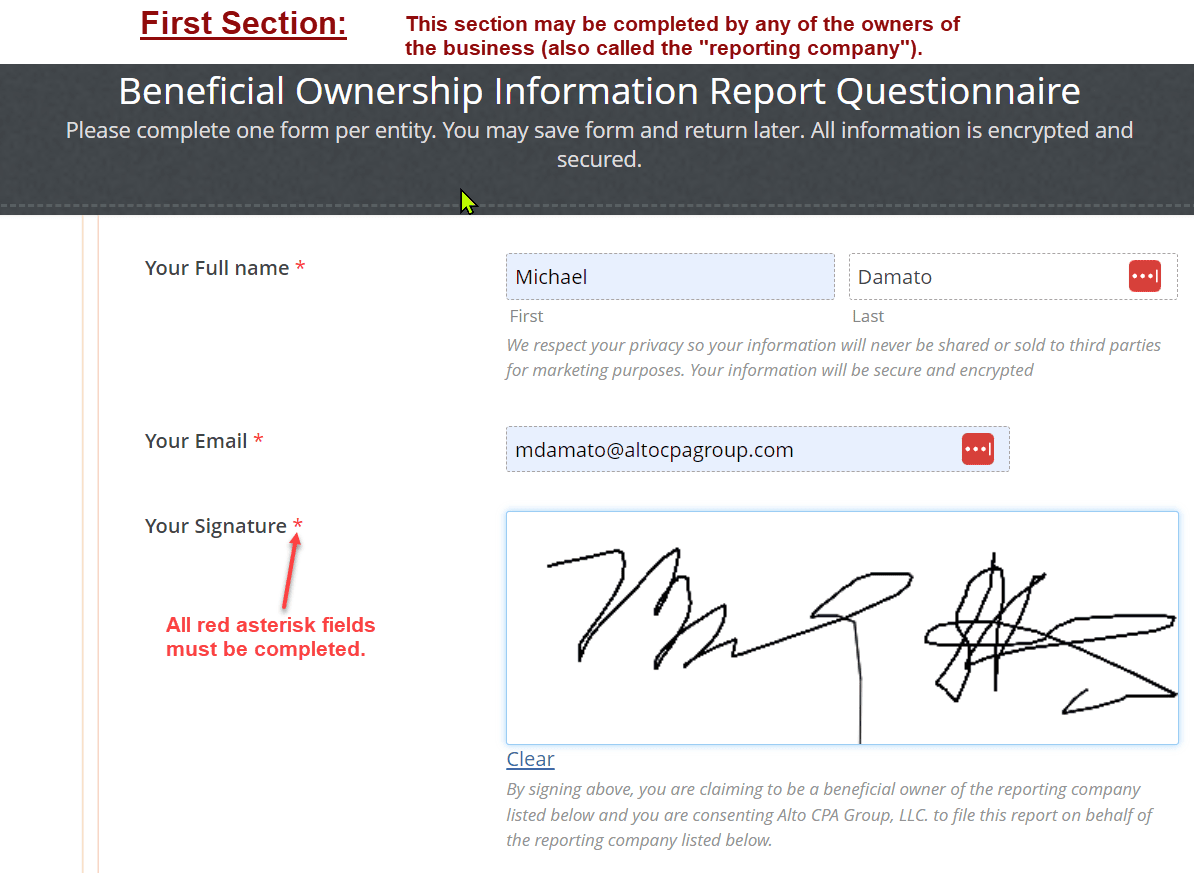
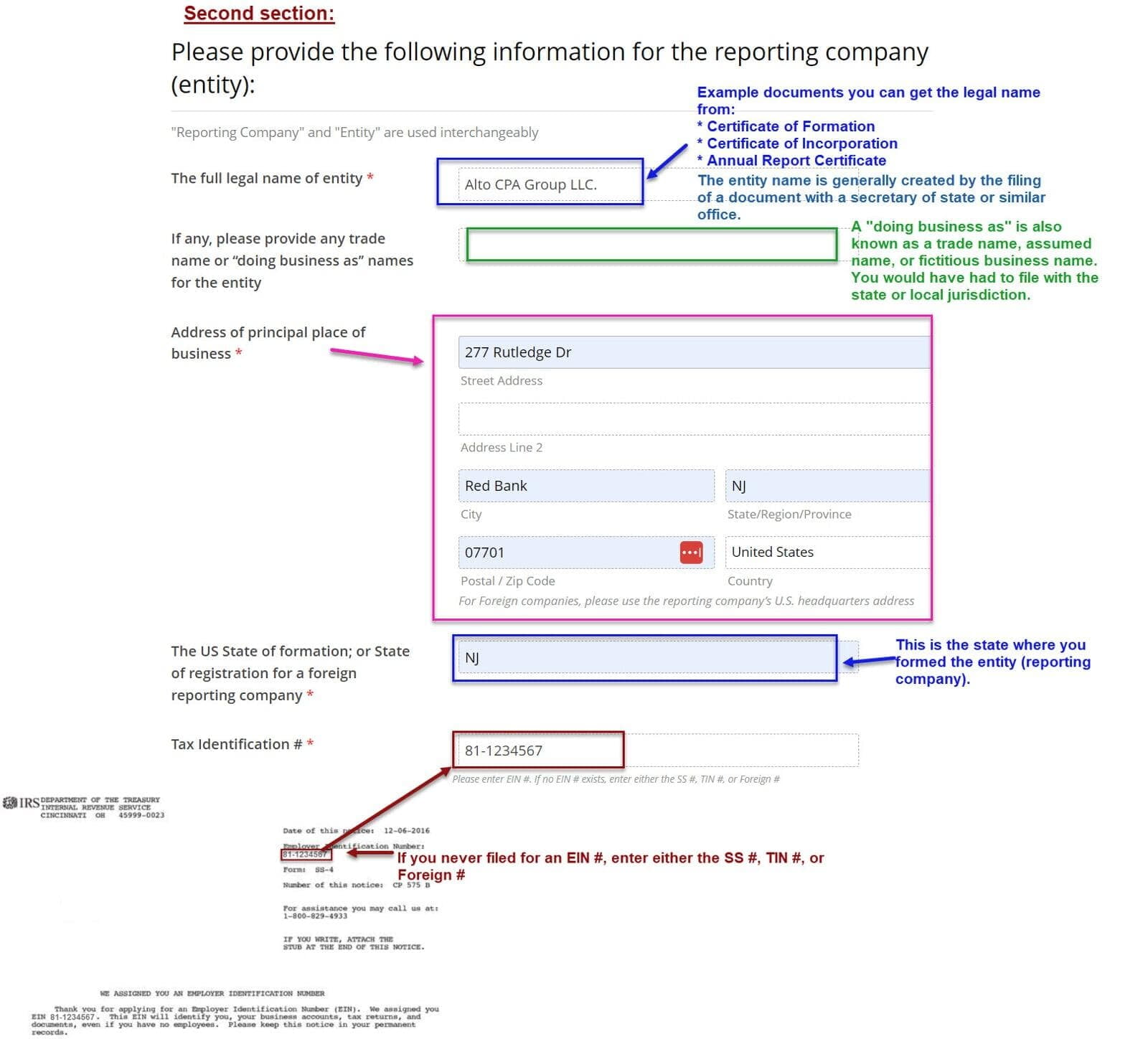
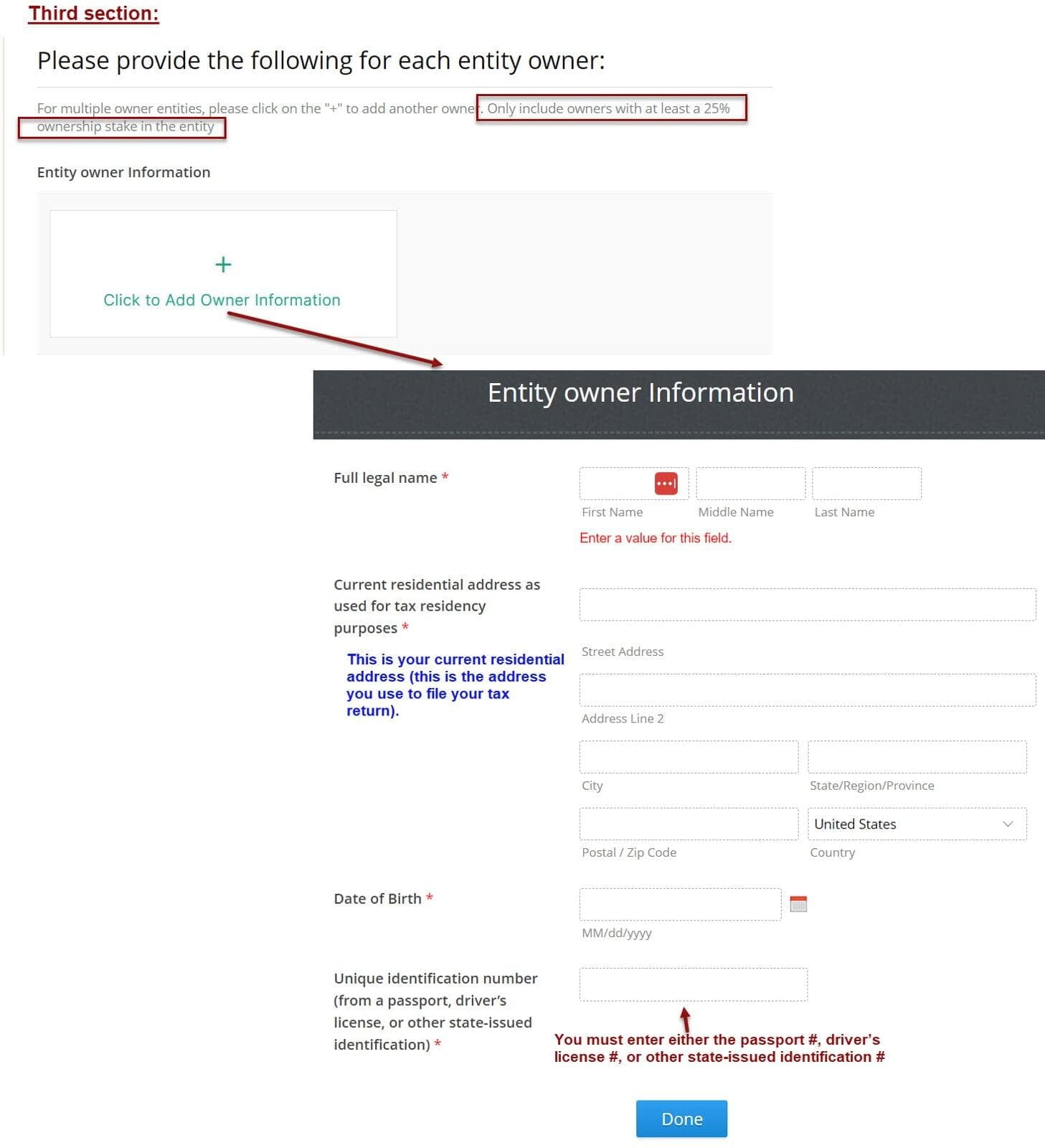
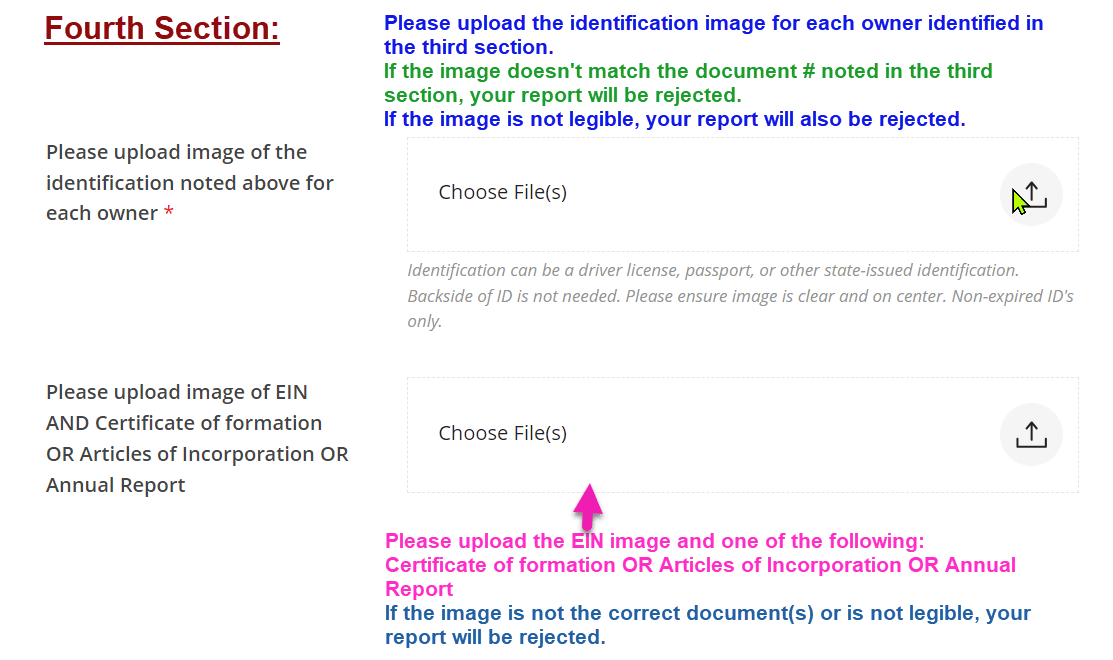
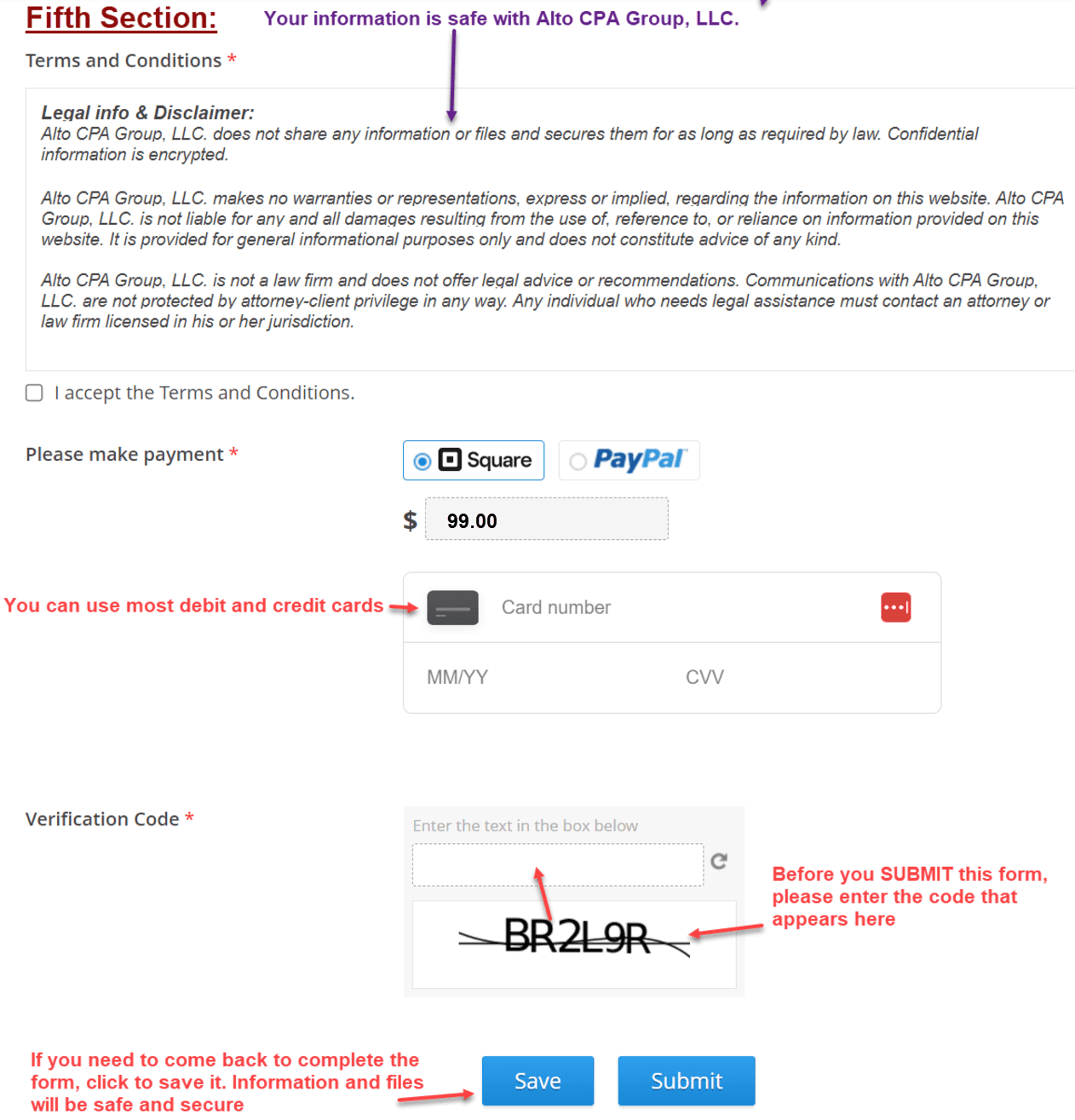
- Please complete form below. We will review and notify you if any additional information is needed.
Click on images below to expand
Who needs to File?

What is Substantial Control
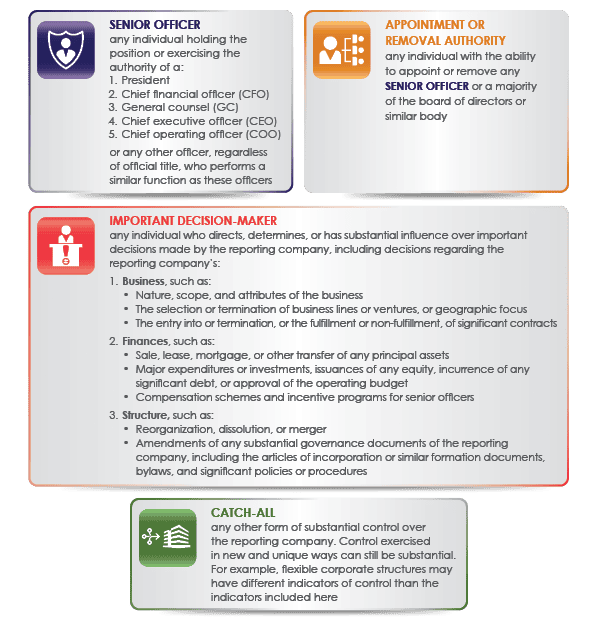
What is Ownership Interest
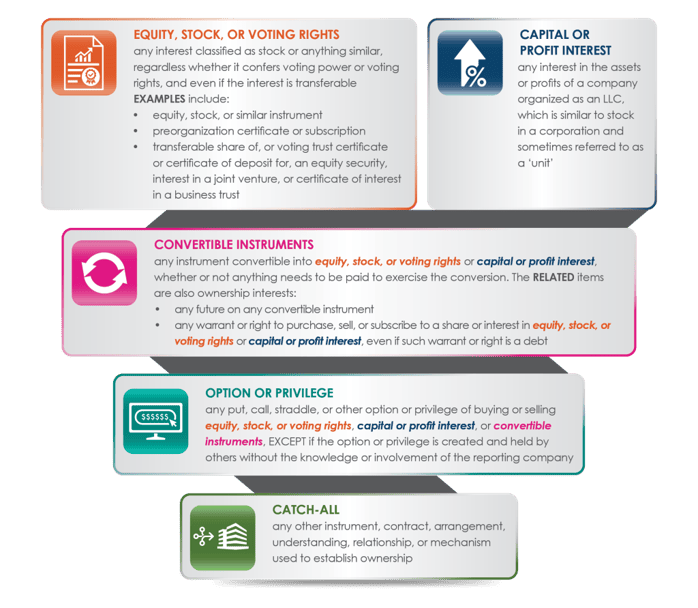
What is a Company Applicant's
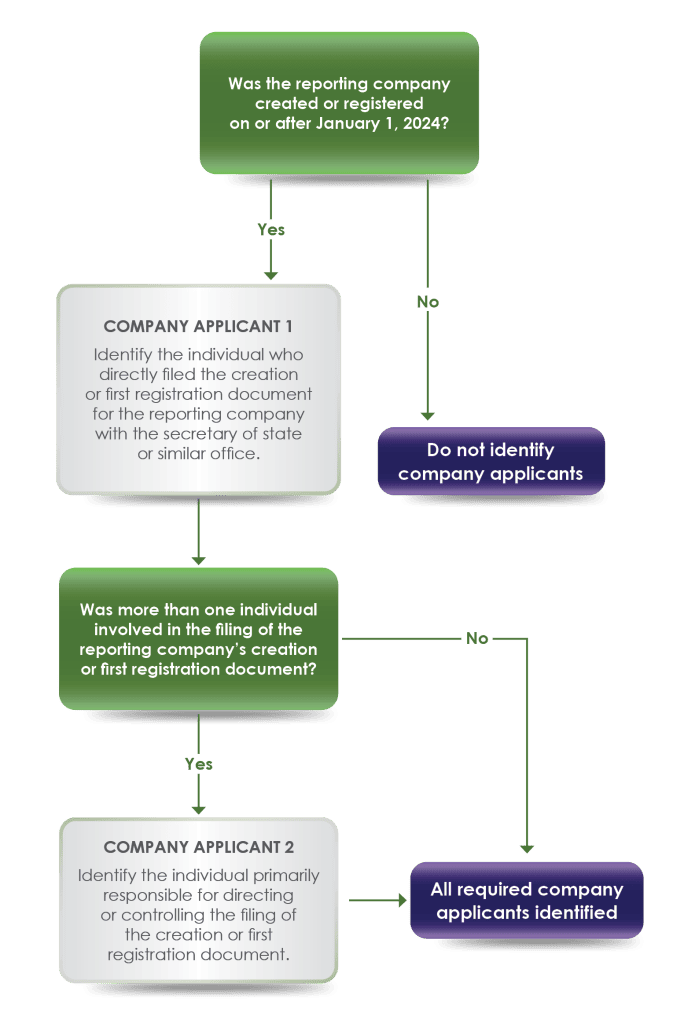
What is a Reporting Company
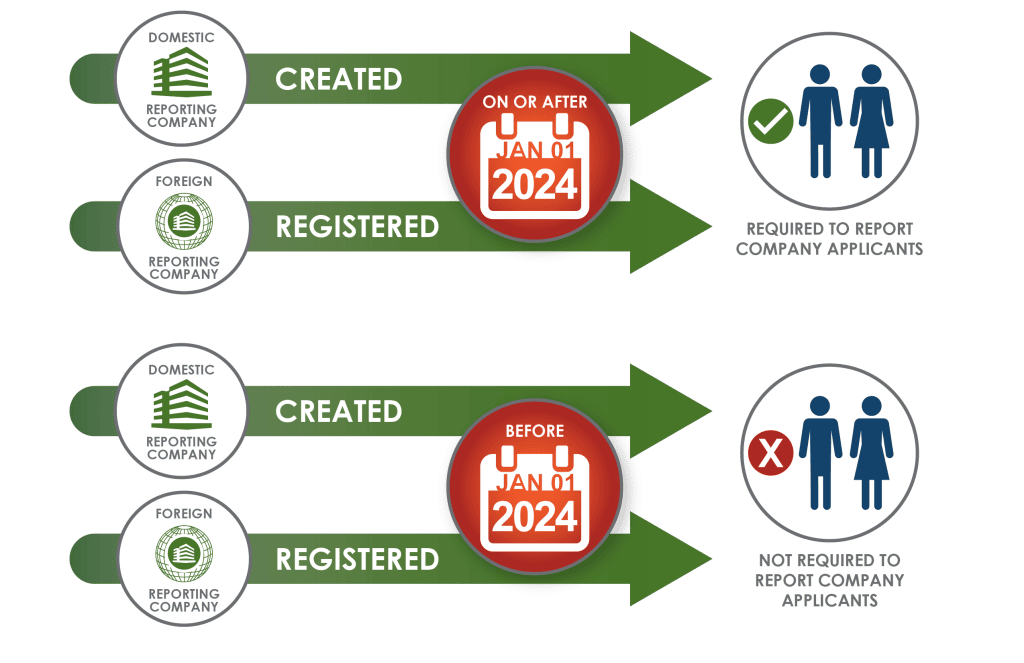
Filing an Initial Report
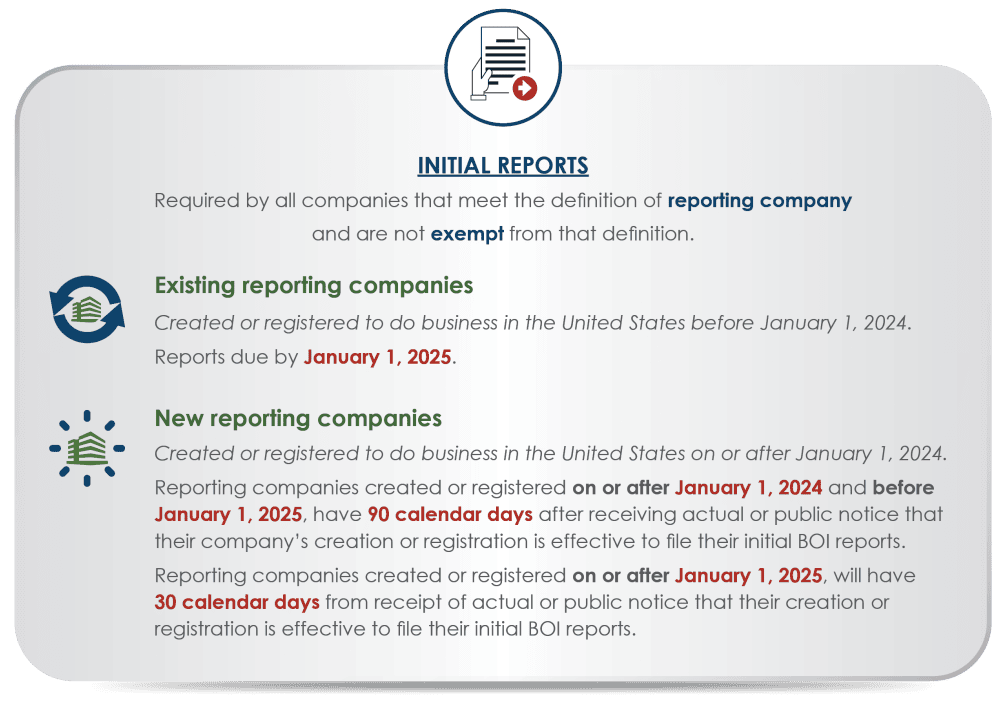
Updating a Report
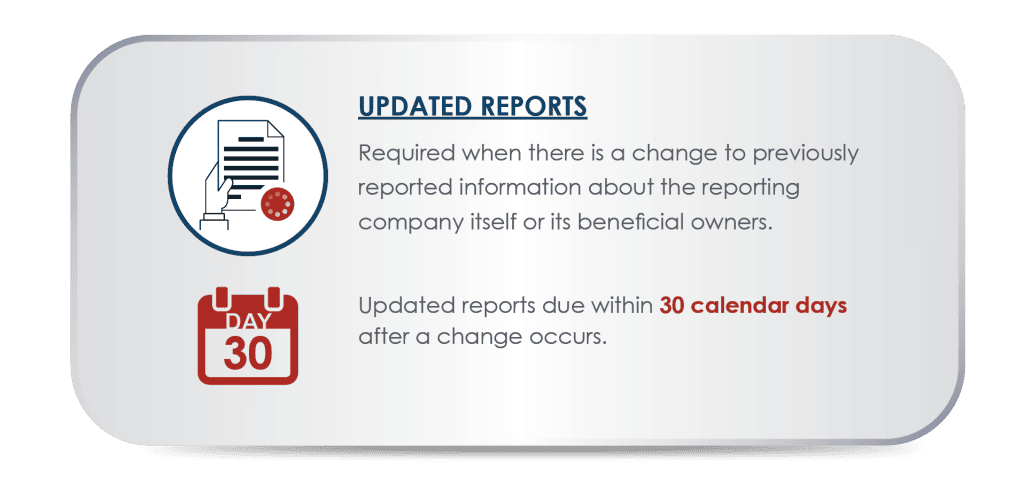
Correcting a Report
